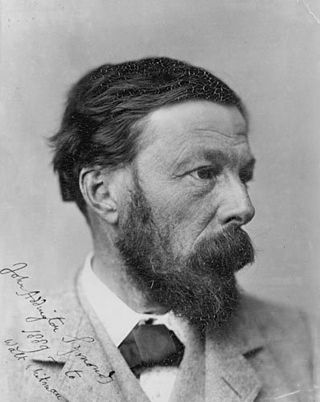
Classics or classical studies is the study of classical antiquity. In the Western world, classics traditionally refers to the study of Classical Greek and Roman literature and their related original languages, Ancient Greek and Latin. Classics also includes Greco-Roman philosophy, history, archaeology, anthropology, art, mythology and society as secondary subjects.

The trivium is the lower division of the seven liberal arts and comprises grammar, logic, and rhetoric.

John Addington Symonds Jr. was an English poet and literary critic. A cultural historian, he was known for his work on the Renaissance, as well as numerous biographies of writers and artists. Although married with children, Symonds supported male love (homosexuality), which he believed could include pederastic as well as egalitarian relationships, referring to it as l'amour de l'impossible. He also wrote much poetry inspired by his same-sex affairs.
John Conington was an English classical scholar. In 1866 he published his best-known work, the translation of the Aeneid of Virgil into the octosyllabic metre of Walter Scott. He was Corpus Professor of Latin at the University of Oxford from 1854 till his death.
The Oxford Classical Dictionary (OCD) is generally considered "the best one-volume dictionary on antiquity," an encyclopædic work in English consisting of articles relating to classical antiquity and its civilizations. It was first published in 1949, edited by Max Cary with the assistance of H. J. Rose, H. P. Harvey, and Alexander Souter. A second edition followed in 1970 (OCD2), edited by Nicholas G. L. Hammond and H. H. Scullard, and a third edition in 1996 (OCD3), edited by Simon Hornblower and Antony Spawforth. A revised third edition was released in 2003, which is nearly identical to the previous third edition. A fourth edition was published in 2012 (OCD4), edited by Simon Hornblower, Antony Spawforth, and Esther Eidinow. In 2016, a fully digital edition launched online, edited by Sander Goldberg (2013–2017) and Tim Whitmarsh (2018–present). Continuously updated on a monthly basis, this edition incorporates all 6,300 entries from OCD4 as well as newly commissioned entries, and features multimedia content and freely accessible maps of the ancient world.

Sir William Smith was an English lexicographer. He became known for his advances in the teaching of Greek and Latin in schools.
Literae humaniores, nicknamed classics, is an undergraduate course focused on classics at the University of Oxford and some other universities. The Latin name means literally "more human literature" and was in contrast to the other main field of study when the university began, i.e. res divinae, also known as theology. Lit. hum., is concerned with human learning, and lit. div. with learning treating of God. In its early days, it encompassed mathematics and natural sciences as well. It is an archetypal humanities course.
Henry Francis Pelham, FSA, FBA was an English scholar and historian. He was Camden Professor of Ancient History at the University of Oxford from 1889 to 1907, and was also President of Trinity College, Oxford, from 1897 to 1907.
Francis John Haverfield, was an English ancient historian, archaeologist, and academic. From 1907 to 1919 he held the Camden Professorship of Ancient History at the University of Oxford.
Richard John Alexander Talbert is a British-American contemporary ancient historian and classicist on the faculty of the University of North Carolina at Chapel Hill, where he was William Rand Kenan, Jr., Professor of History and is currently Research Professor in charge of the Ancient World Mapping Center. Talbert is a leading scholar of ancient geography and ideas of space in the ancient Mediterranean world.

Martin Litchfield West, was a British philologist and classical scholar. In recognition of his contribution to scholarship, he was awarded the Order of Merit in 2014.
Michael Lapidge, FBA is a scholar in the field of Medieval Latin literature, particularly that composed in Anglo-Saxon England during the period 600–1100 AD; he is an emeritus Fellow of Clare College, Cambridge, a Fellow of the British Academy, and winner of the 2009 Sir Israel Gollancz Prize.
John Moyer Heathcote was an English barrister and real tennis player. He was one of the committee members at the Marylebone Cricket Club responsible for drafting the original rules of lawn tennis and is credited with devising the cloth covering for the tennis ball.
John George Clark Anderson was a classical scholar, who was Camden Professor of Ancient History at the University of Oxford from 1927 to 1936.
Philomen Probert is a British classicist and academic, specialising in linguistics. She is Professor of Classical Philology and Linguistics at the University of Oxford.
Jane Lucy Lightfoot is a British classical scholar. She is Professor of Greek Literature at the University of Oxford and a fellow of New College, Oxford.

The University of Cambridge is a collegiate public research university in Cambridge, England. Founded in 1209 and granted a royal charter by King Henry III in 1231, Cambridge is the second-oldest university in the English-speaking world and the world's fourth-oldest surviving university. The history and influence of the University of Cambridge has made it one of the most prestigious universities in the world. Numerous scholarships, prizes, honors, and awards specific to the university are awarded to prospective or current students.
The George Grote Prize in Ancient History is an early career academic prize for notable unpublished work by emerging scholars in the field of ancient history.
Thomas Mannack is a German classical archaeologist.
Colin Mackennal Kraay, FBA, FSA was an English numismatist. He was the Keeper of the Heberden Coin Room at the Ashmolean Museum from 1975 to his death in 1982.